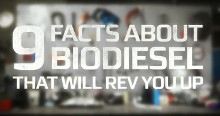 Today is National Biodiesel Day and the celebration of Rudolf Diesel, the inventor of the diesel engine. Many will remember that similar to the first “gas” engine running on ethanol, the first “diesel” engine ran on peanut oil. In fact, National Biodiesel Board (NBB) notes that when he created his engine, he envisioned a time when vegetable oils would one day be as important as petroleum among transportation fuels. Because of his foresight, and his contribution of the compression ignition engine, Biodiesel Day is celebrated on the anniversary of Diesel’s birthday.
Today is National Biodiesel Day and the celebration of Rudolf Diesel, the inventor of the diesel engine. Many will remember that similar to the first “gas” engine running on ethanol, the first “diesel” engine ran on peanut oil. In fact, National Biodiesel Board (NBB) notes that when he created his engine, he envisioned a time when vegetable oils would one day be as important as petroleum among transportation fuels. Because of his foresight, and his contribution of the compression ignition engine, Biodiesel Day is celebrated on the anniversary of Diesel’s birthday.
“I can’t imagine what Rudolf Diesel would think if he saw how his vision has come to fruition in today’s commercial biodiesel industry, a more than 2 billion gallon US market,” said NBB chairman Ron Marr. “It is here, now, cutting carbon emissions, supporting domestic green energy jobs, and benefiting consumers from coast to coast.”
To celebrate Biodiesel Day, here are nine facts about biodiesel that will rev you up! But first, a super cool video about biodiesel.
- Biodiesel is Cleaner-Burning – It burns much cleaner than petroleum diesel, reducing particulate matter, carbon monoxide, unburned hydrocarbons, and other smog causing particles.
- Biodiesel emissions 86 percent less than petroleum diesel – Lifecycle emissions are greatly reduced by using biodiesel. The 2 billion gallon biodiesel market last year cut carbon by some 18 million metric tons or the annual greenhouse gas emissions of 3.8 million cars. This is more emissions than from all of the cars in Colorado and Connecticut combined.
- Biodiesel is renewable – Biodiesel is made from renewable resources like soybean oil, animal fats, and recycled cooking oil. It has the highest energy balance of any commercially available fuel, returning 5.5 units of energy for every one unit needed to produce it.
- Biodiesel is less toxic than table salt – On land and in water biodiesel’s low toxicity is a major benefit of handling the fuel. Regular table salt is nearly 10 times more toxic than biodiesel so the environmental concerns associated with transporting fuels aren’t a problem with biodiesel.
- Biodiesel biodegrades faster than sugar – Biodiesel degrades four times faster than petroleum diesel. Within 28 days in water, pure biodiesel degrades nearly 90 percent, or slightly faster than the dextrose test sugar used as a scientific baseline. This is another reason it is much safer to handle and transport than petroleum.
- Biodiesel is the American alternative to foreign oil – Biodiesel is produced from coast to coast in nearly every state with regionally diverse raw materials. It is made from locally available byproducts and coproducts – soybean oil in the Grain Belt, recycled cooking oil in urban areas, animal fats from rendering plants in the Southwest and more.
- Biodiesel supports 62,000 U.S. jobs – The biodiesel industry supports thousands of domestic, green energy jobs from lab technicians to engineers to truck drivers. All aspects of the US economy are supported by biodiesel production.
- Biodiesel can be used in existing diesel engines without modification – Biodiesel has widespread support across all diesel applications because it is easy to use with existing infrastructure. From 4-door sedans to bulldozers, from street sweepers to school buses, from snow plows to semi-trucks, and even in boats and home heating systems, the use of biodiesel is as diverse as the diesel engine itself!
- Biodiesel is supported by all major engine manufacturers – Detroit’s Big Three Automakers – Ford, General Motors and Fiat Chrysler – have supported high biodiesel blends for nearly a decade. Although vehicle manufacturers don’t warranty fuel, rather just their own parts and workmanship, nearly all now formally support blends of 20 percent biodiesel (B20) in their equipment. More than 78 percent of the diesel vehicles coming off production lines today cite biodiesel use in their owners’ manuals.
So there you have it – clean, renewable, American made, biodegradable, reliable, ready-to-use, environmentally friendly, and creates American jobs. So what’s in your tank?

